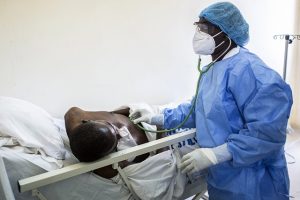
#OutToLunch The easiest way to regulate medical bills in private hospitals
By Denis Jjuuko The High Court in Kampala issued orders to force government to regulate medical bills for COVID-19 patients. The worst place to be for an average Ugandan today is to be in need of an Intensive Care Unit (ICU) bed so you could see another day. It is understandable that the high court came to the side of the people in need of ICU and High Dependency Unit (HDU) beds but it is the wrong thing. Uganda subscribes to the liberal economy theory where everyone charges what they want. Demand and supply determine how much people charge. In early June when many people were dying and as Ugandans looked for anything that could help them survive COVID-19, lemons, and I mean lemons, went from Shs100 in some markets in Kampala to Shs2000 each! If you need a taxi in rush hours, they triple the transport fare from A to B. Each fuel station in Kampala from the same brand has a different price per a litre of petrol. In Bakuli near Mengo, a litre of petrol is cheaper by about Shs500 than in Ntinda or Bukoto. Schools charge as exorbitant fees as medical facilities. A kid in a nursery school who is trained how to use a potty, which it already knows pays more than those at some universities. The reason is because parents are very excited when their offspring are still young. As they grow, the excitement wanes but also there are more options. Some people go to universities while others abandon school and go do other things since they are adults. The point is that in Uganda everyone charges whatever they want whether it is medical or not. And this didn’t start with COVID-19. Pediatricians to examine a child for flue charge as much as Shs100,000 in consultancy fees! How is the government going to regulate these fees? Cancer patients long before COVID-19 have been paying enormous bills yet the government spends USD150 million a year on average taking its officials abroad for treatment. This is enough money to set up hospitals here. I was looking at the Kampala COVID-19 ICU/HDU Dashboard set up by the Association of Anesthesiologists of Uganda that give real time update of the availability of ICU/HDU. A hospital in one of the suburbs set up originally in a home less than 10 years ago has 17 ICU beds — the most in any private facility. How did they get them? This hospital is run by a couple who are as old as the NRM has been in power. How did they set up the facility where the government has failed? The easiest way for the government to regulate medical bills and even school fees is by building more hospitals and schools. Most people in government today who make decisions were either born in public hospitals or at home by traditional birth attendants. The majority if not all went to public schools. Today, nobody with some little income wants to take their kids to public schools. People rather take on unbearable debt borrowing school fees to give their kids a fighting chance later in life than sending them to a school where they won’t learn much. Uganda’s population has significantly grown over the last 30 years from 18 million to 45 million today but the public facilities such as schools and health facilities haven’t. If we had working public schools and hospitals, we won’t be running to court to regulate anything. The super wealthy would take their kids to the few expensive private schools while the majority would be fine with public schools. The same with hospitals. The best way to regulate medical bills in private hospitals is by having effective public hospitals in adequate numbers to match the population. The private hospitals will then charge what is acceptable to stay in business. They would also improve their service to attract the super wealthy customers. The same would be for schools. Today, we have 529 members of parliament. The argument for the proliferation of political constituencies is to serve the population. Why don’t we flip the chart and ensure that before a constituency is set up, there is a proper well managed hospital and public schools to serve the increasing population? Do people want more MPs or more hospitals and schools? The money spent on a single MP every five-year term is enough to set up a hospital and a school in that area. If we invested in such for 10 years and then bring in MPs, the MPs wouldn’t have to buy 25-year-old Toyata Supercustom vans and paint them with a cross and the word ambulance. The writer is a communication and visibility consultant. djjuuko@gmail.com

